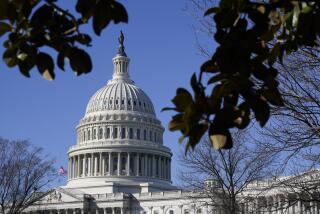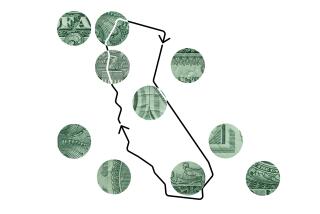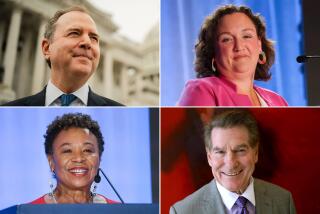Money doesn’t always buy the office
Like an out-of-town gambler trying to elbow his way into the big game, Steve Poizner announced last week that he’d ante up $15 million of his own money for his campaign to become California’s next governor. He’s hoping that money changes everything. Or at least something.
If the insurance commissioner makes good on his pledge by the end of the year, as promised, his total donations will hit $19 million, identical to what Meg Whitman has already given to her campaign. In the year before the 2010 Republican primary, in other words, two candidates will have put in almost $40 million, nearly what the sitting governor, Arnold Schwarzenegger, raised and spent for his primary and general election campaigns combined in 2006. Whitman, the former EBay chief executive leading the pack as she makes her first bid for office, has talked of a $150-million campaign.
It is a central reality in California politics: Few elected officials can become popular enough quickly enough to raise the money needed to run for the highest statewide offices. The state is too big, the pool of potential voters too deep, the media markets too dispersed, and term limits sharply lessen the time any candidate has to curry favor.
Not by accident, the only Democratic candidate for governor is a man who has been around the block a few million times in pre-term-limits days: the perennially elected Jerry Brown. Even with their regional allure, the mayors of San Francisco and Los Angeles couldn’t get their campaigns in gear swiftly enough this year to challenge him.
But if it takes money to buy a seat at the table, the means of getting that money -- most often by succeeding in the cutthroat reaches of business -- has in the past guaranteed defeat. Reminders of why that is so also surfaced last week.
In comments made under oath in a Delaware court case involving EBay, a witness described being told by a person who worked for Whitman at the company that there were “two Meg Whitmans” -- a “good” and an “evil Meg.” (“False and malicious,” Whitman’s camp responded, fully aware that opposition researchers are rarely handed such gifts. The underling being quoted also issued a statement denying the comments.)
Whatever their prominence at this point, rough times may lie ahead for Whitman and for Poizner, a former software entrepreneur serving his first term in office, and Republican Senate hopeful Carly Fiorina, a former Hewlett-Packard chief.
“There’s a long and storied history of crash-and-burn self-financed candidates in California,” said Jennifer Steen, a Yale University political scientist who wrote a book on wealthy congressional candidates.
Flaming out recently were Steve Westly, the Silicon Valley entrepreneur who lost to Phil Angelides in the Democratic gubernatorial primary in 2006, and Bill Simon, who won the Republican nomination in 2002 but lost to Democrat Gray Davis, the incumbent.
But the campaign that most resembles this one, at least early on, is the Democratic primary for governor 12 years ago.
In 1998, the seriously wealthy Al Checchi spent $40 million arguing that, as an up-from-the-bootstraps financier who had recently engineered control of Northwest Airlines, he could blow freshness into the stale Capitol. His alter ego: Meg Whitman.
Less wealthy, but rich enough to throw in $15 million of her own, was Jane Harman, the South Bay congresswoman who argued that she had the right mix of outsider bravura and insider knowledge. Her stand-in: Steve Poizner.
Bringing up the rear, money-wise, was Davis, who was almost totally reliant on fundraising to gather a fraction of what the others found in their pockets. His doppelganger: Tom Campbell, the former congressman and state finance director who has made mastery of the system his calling card.
The race was astonishingly volatile, with voters hopscotching between camps as they got to know -- and often not to like -- the candidates. As Checchi and Harman gyrated in the polls, Davis, the turtle of the field, hung on for dear life. Toward the end of March, he was dead last. At the beginning of June, he was the nominee.
What had happened was a classic outcome of rich-candidate races, with a twist: There were, as now, two rich candidates engaged in aerial warfare. Checchi unleashed negative ads at the end of March that served to both mortally wound Harman and, unintended, himself. Voters who’d bought the notion of outsider-as-breath-of-fresh-air didn’t cotton to his behaving like the politicians they abhorred.
He also suffered some rookie stumbles, despite his two years of hard preparation before the spring campaign. Harman never gained traction, in part because of his fusillade and her refusal to offer specifics.
Candidates who vault into campaigns without the experience to match their money usually suffer from two problems, Steen said: Voters see their credentials as weak, and they fumble their campaigns.
“They think they know everything; they think they know what to do,” she said. “You hear all kinds of stories about these candidates just not knowing how to take advice.”
Moreover, they tend to have had little interest in the political system, even down to voting, which makes them appear opportunistic. Whitman and Fiorina have already admitted having voted infrequently. “Not having a record in public affairs is a real liability,” Steen said.
Veterans also have built-in relationships with voters, which ease their paths when the inevitable bumps occur. In a poll released last week by the Public Policy Institute of California, voters more often than not said they want to see candidates spend donors’ money instead of their own. That, pollster Mark Baldassare said, is because voters feel more secure with a candidate who has attracted broad support.
“People are looking for validation . . . that there’s some like-minded groups and individuals that have supported that person,” he said, “and campaign funding is one of those sources of validation.”
While similarities abound, there are critical differences between the 1998 campaign and next year’s. In 1998, the underdog was Davis, who despite his dispirited start had long-term ties to organized labor and other key party allies; Campbell, by contrast, has a testy relationship with the conservative voters who dominate his party.
More important, in 1998 a whopping two of every three voters said the state was on the right track, making a lurch to an unknown a risky proposition. Now a similar proportion says the state is heading the wrong way, opening the possibility that voters will want to take a chance.
But voters may be caught between dual disdain -- for politicians and for business titans of the sort many blame for the nation’s economic collapse.
That is “both the challenge and the opportunity for Meg Whitman and Steve Poizner,” said Baldassare. “What’s going to win out?”
Each Sunday, The Week examines implications of major stories. It is archived at latimes.com/theweek.
More to Read
Start your day right
Sign up for Essential California for news, features and recommendations from the L.A. Times and beyond in your inbox six days a week.
You may occasionally receive promotional content from the Los Angeles Times.







